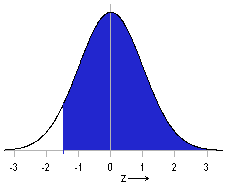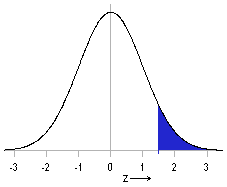Difference between revisions of "Documentation/How Tos/Calc: ZTEST function"
From Apache OpenOffice Wiki
< Documentation | How Tos
OOoWikiBot (Talk | contribs) m (Bot: Adding Category: Documentation) |
OOoWikiBot (Talk | contribs) m (Robot: Automated text replacement %s) |
||
| Line 36: | Line 36: | ||
* [[Documentation/How_Tos/Calc: Functions listed alphabetically|Functions listed alphabetically]] | * [[Documentation/How_Tos/Calc: Functions listed alphabetically|Functions listed alphabetically]] | ||
* [[Documentation/How_Tos/Calc: Functions listed by category|Functions listed by category]]}} | * [[Documentation/How_Tos/Calc: Functions listed by category|Functions listed by category]]}} | ||
| − | [[Category: Documentation]] | + | [[Category: Documentation/Reference/Calc]] |
Revision as of 09:56, 24 November 2009
ZTEST
Returns the result of a z-test.
Syntax:
ZTEST(data; μ σ)
- data is a range or array containing a random sample from a population (population assumed to have a normal distribution).
- μ is the (known) mean of the population.
- σ is the (known) standard deviation of the population. If omitted, it is estimated from the sample data by STDEV(data).
- where m is the sample mean and n the number in the sample. When the mean and standard deviation of the population are known, the z statistic forms a standard normal distribution - that is, a normal distribution with mean=0 and standard deviation=1.
- ZTEST returns the one-sided cumulative probability - the area under the standard normal curve to the right of the z value (shaded blue here):


Example:
ZTEST(A2:A20; 9; 2)
- returns the result of a z-test on a sample A2:A20 drawn from a population with known mean 9 and known standard deviation 2.
Issues:
- Excel has referred to this as both a one-tailed and a two-tailed test. Neither is correct - the test is one-sided as described above. For example when z = -1.5 part of the left tail and all of the right tail are included. This is an unconventional measure, but can be used.
- Calc has produced incorrect results for the 3 parameter version of this function. See issue 90759.
- As with all statistics, a good understanding is needed for reliable results.